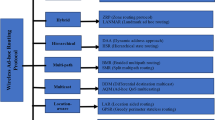Abstract
Routing in network is a classic issue to be solved. To route the data among the nodes without any interruptions and without getting yield in any kind of malicious attack is a tedious task. Though there exist many routing techniques which were near success in the past some part of the problems are always left unsolved. Trust-based routing techniques and the bio-inspired path is connecting techniques area embedded together to solve this. The security of the proposed technique is given a big significance, which takes care of the rest of the key points. Initially, when a node tries to enter into the network which was already secured and confined by trustable nodes, we provide a two-way security check both from the new node and from the host node. This is made possible by applying digital signature algorithm, hash message authentication code, and message-digest algorithms for signature generations, hash value generation, and its corresponding encrypt and decrypt procedure. Elliptic curve Diffie–Hellman algorithm is used for certificate verification, after which the node is provided with the broadcast key. In the case of routing, ant colony optimization is applied to detect the best path for routing from root to destiny, and this path is again verified by trust frameworks and certain calculations. This highly secured verification and authentication process make the proposed advanced resilient data consigning mechanism (ARDC) stand out from the existing routing mechanisms. The proposed ARDC mechanism is analyzed against various network frameworks as throughput, packet loss, overhead, delivery ratio, delivery latency, and hop count and path reliability to prove its effectiveness. Further, the routing capability is also analyzed by comparing it against traditional DSR, destination-sequenced distance-vector and open shortest path first protocols.


















Similar content being viewed by others
Change history
23 June 2022
This article has been retracted. Please see the Retraction Notice for more detail: https://doi.org/10.1007/s12652-022-04221-0
References
Ahmad M, Hameed A (2018) A bio-inspired clustering in mobile adhoc networks for internet of things based on honey bee and genetic algorithm. J Ambient Intell Humaniz Comput. https://doi.org/10.1007/s12652-018-1141-4
Airehrour A, Jairo G, Ray SK (2015) GradeTrust: a secure trust-based routing protocol for MANETs. In: International telecommunication networks and applications conference (ITNAC). IEEE, Sydney, pp 65–70
Cai RJ, Li XJ, Chong PHJ (2019) An evolutionary self-cooperative trust scheme against routing disruptions in MANETs. IEEE Trans Mob Comput 18(1):42–55
Deng H, Li W, Agrawal D (2002) Routing security in wireless ad hoc networks. IEEE Commun Mag 40(10):70–75
Gupta NK, Pandey K (2013) Trust-based ad-hoc on-demand routing protocol for MANET. In: Proceeding of the sixth international conference on contemporary computing (IC3). IEEE, Noida, pp 225–231
Hurley-Smith D, Wetherall J, Adekunle A (2017) SUPERMAN: security using pre-existing routing for mobile ad hoc networks. IEEE Trans Mob Comput 16(10):2927–2940
Kukreja D, Dhurandher SK, Reddy BVR (2018) Power-aware malicious nodes detection for securing MANETs against packet forwarding misbehavior attack. J Ambient Intell Humaniz Comput 9(4):941–956
Manjula T, Anand B (2019) A secured multiplicative Diffie Hellman key exchange routing approach for mobile adhoc network. J Ambient Intell Humaniz Comput. https://doi.org/10.1007/s12652-019-01612-8
Marchang NR, Datta R (2012) Lightweight trust-based routing protocols for mobile adhoc networks. IET Inf Secur 6(2):77–83
Patel H, Agarwal V (2008) MATLAB-based modeling to study the effect of partial shading on PV array characteristics. IEEE Trans Energy Convers 23(1):302–310
Ramesh S, Ganesh Kumar P (2013) A comparative analysis of routing techniques in intermittently connected MANETs. Asian J Sci Res 6(4):736–744
Ramesh S, Praveen R, Indira R, Ganesh Kumar P (2012) A survey on routing methodologies for MANET. In: Proceedings of the fourth IEEE international conference on advanced computing. IEEE, Chennai, pp 1–6
Ramesh S, Praveen R, Indira R, Ganesh Kumar P (2013) Ant routing protocol for intermittently connected mobile networks. In: Proceedings of the fifth IEEE international conference on advanced computing. IEEE, Chennai, pp 419–425
Shabut AM, Dahal KP, Bista SK, Awan IU (2015) Recommendation based trust model with an effective defensive scheme. IEEE Trans Mobile Comput 14(10):2101–2115
Ullah K, Das R, Das P, Roy A (2015) Trusted and secured routing in MANET: an improved approach. In: Proceeding of the international symposium on advanced computing and communication (ISACC). IEEE, Silchar, pp 1–6
Uma Maheswari P, Ganesh Kumar P (2017) Dynamic detection and prevention of clone attack in wireless sensor networks. Wirel Pers Commun 94(4):2043–2054
Wang P, Reeves DS, Ning P (2005) Secure address auto-configuration for mobile ad hoc networks. In: Proceedings of 2nd annual international conference MobiQuitous. IEEE, San Diego, pp 519–522
Xia H, Jia Z, Ju L, Zhu Y (2011) Trust management model for mobile adhoc network based on the analytic hierarchy process and fuzzy theory. IET Wirel Sens Syst 1(4):248–266
Author information
Authors and Affiliations
Corresponding author
Additional information
Publisher's Note
Springer Nature remains neutral with regard to jurisdictional claims in published maps and institutional affiliations.
This article has been retracted. Please see the retraction notice for more detail: https://doi.org/10.1007/s12652-022-04221-0
About this article
Cite this article
Karthikeyan, K., Ramesh, S., Kirubakaran, N. et al. RETRACTED ARTICLE: Advanced resilient data consigning mechanism for mobile adhoc networks. J Ambient Intell Human Comput 12, 4255–4268 (2021). https://doi.org/10.1007/s12652-020-01820-7
Received:
Accepted:
Published:
Issue Date:
DOI: https://doi.org/10.1007/s12652-020-01820-7




